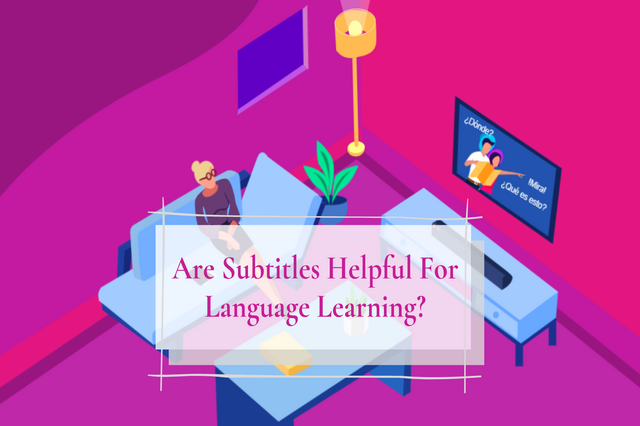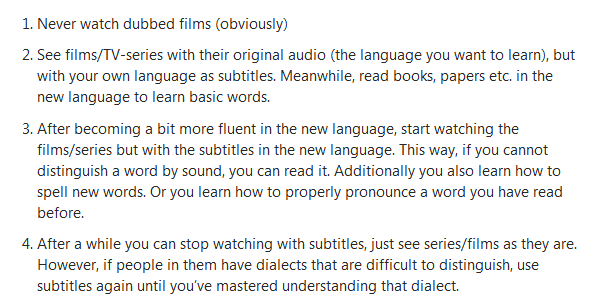
Finally, I get to write this very interesting topic regarding the use of subtitles which has been the major reason I started learning a foreign language. Since I’m learning Spanish I’ll use that as an example throughout this post.
If you’ve been wondering ‘Are subtitles helpful for language learning’ the answer is yes. In fact, not just for normal people in general but also for people with disabilities such as deaf people.
Here’s an interesting article you might want to read. It’s written by Noa Talavan called Using Subtitles To Enhance Foreign Language Learning.
Depending on what level you are in the subtitles you use can be different and each stage has its own pros and cons. Below are the 3 steps you can use them. Do these slowly and take as much time as you need.
I know it can be quite difficult to have your native language subs on everything you watch especially if your language isn’t that popular like mine. For this, I suggest using English subs or a language you know well.
I prefer the former because back then when I was learning English I could still enjoy what I was watching despite my lack of vocabulary. Even if you only understand 30% of the story it’s still progress.
You just have to change your mindset and shift your focus on something else like the accent, the intonation, etc.
Yes, subtitles can support language learning, especially when used strategically.
Recommended progression:
Benefits of native subtitles: Build vocabulary, improve listening, and expose you to informal expressions.
Benefits of target-language subtitles: improve reading speed and accuracy, and connect the spoken and written forms.
Turning off subtitles gives you full immersion and forces you to rely purely on audio.
Practical method: pick scenes, replay them, transcribe dialogue, mimic pronunciation, and use those clips as study material.
In my opinion, it’s better to use L1. They might have trouble understanding if they use L2 right away. If they already know the basics of the target language then L2 can definitely help.

Take a look at Rick Denison’s recommendation above. Mine is the second one in Spanish. What’s yours?
During my childhood, I used to watch shows in my native subs with the original audio. As I grew up I no longer needed them to watch English-speaking movies & series.
Given the fact that my English was pretty much ‘broken’, I can understand them just fine.

I’m inclined to what Martin Ekman suggested, though I haven’t really tried using Spanish subs that much.
Yes, you can. To what extent? Well, you won’t reach fluency. You’ll probably just pick up some words, idioms, metaphors, etc. The question is which subtitle should you be using, native or target language?
There was a study published by Holger Mitterer (Max Planck Institute for Psycholinguistics) and James McQueen (MPI and Radboud University Nijmegen) that shows students who learn a foreign language with subtitles on (the target language) shows improvement whereas having the native subtitles on doesn’t do much help.
Here’s another study called Watching Subtitled Films Can Help Learning Foreign Languages by J. Birulés-Muntané and S. Soto-Faraco.
Some language apps out there don’t have the words you usually use in your daily lives or one that explains your occupation, situations, etc. With movies or series perhaps you can so when you study the conversations they might come naturally when you use them.
The general benefit is you get to enjoy them without having to guess what on earth are they talking about. Some people might say having it on can be a distraction because you’ll focus on the subs rather than watching.
At first, yes but slowly you’ll get used to it.
Another obvious benefit is you get to increase your vocabulary and improve your pronunciation and listening skills. You’ll find yourself saying ‘Oh, so that’s what it means’ a lot.
The reason why I mention the last two is because it’s using original audio, not dubbing and the speech speed reflects how people would normally say it. Learning new words, phrases, slang, etc this way is great because some of them you won’t even find in textbooks.
This is one of my favorite methods because frankly, this is how I polished my intonation and pronunciation when I was learning English, not podcasts and not radio.
I know it can be a bit tiring having to pause and play endlessly to practice, but if the result is achieved at the end of the day, don’t you think it’s worth it?
You get to know the spelling of the words and how they are pronounced. You also get to improve your reading speed. When you read you need to understand them fast so this indirectly improves your understanding skill as well.
It can be overwhelming for newbies so this is not recommended but for others, this is really valuable.
You can fully focus on listening and understanding the dialogue. I call this an absolute immersion. You can do this only when you’re confident in your ability to comprehend.
I admit this has been my preference for as long as I can remember.
It’s easy because they are already in a language that I understand. I do rely heavily on it for certain dialogues or scenes I find difficult to comprehend. If it’s the opposite I just ignore it completely.
The disadvantage is that there are many ways to say the same thing and sometimes a literal translation works and vice versa. This can be confusing. Perhaps what you see on TV there could be an easier way to say it.
When you’ve been watching lots of videos remember to note this down. Later on, just pick the one you feel easier to say depending on what situation and how often people use it.
I’ve done this once. What I realized was doing it this way can be a great practice for your mental exercise. When I came across words I vaguely remember I found myself wracking my brain to find out the meaning and I won’t hit play until I figure it out.
It was exhausting but I was happy.
Another thing I like about it is you get to know how they sound when natives say it slowly, normally, and fast. The thing with Spanish is you don’t know where the commas and full stops are when they speak freaking fast.
With this, you’ll be able to. If you want to test your comprehension skills, try this.
I’ve also done this once and I’m never going to do it again. I’m not a fan of dubbing because I prefer to hear the original audio so I know the pronunciation and intonation of each word but decided to try it out anyway.
I hated it instantly because I was hearing two voices and they drove me nuts!
I couldn’t enjoy the series at all. It would be nice if they lowered the original audio or even better, mute it.
Does anybody find this way useful or helpful in any way?

Start with your favorite genre. Choose something you don’t mind replaying countless times. First, just enjoy them. Then, while watching write down the minutes and seconds of the scene(s) you want to use.
When you finish do these;
The above steps are a great exercise to train your ears and improve your writing and speaking skills. As you do this you’ll probably notice some interesting words and grammar structures.
Back then, I used to write down words as I watched telenovelas. At some point, it did confuse me like she was saying amiga but he says amigo. What’s happening?
You can dissect each scene and take note of the words, verbs, and grammar structures being used. Go to your grammar book or website(s) you use and find out what tense is being used in those dialogues.
If your intention is to improve your accent or pronunciation you have great resources in hand because these are authentic.
So, between audio in the target language with native subs and dubbing in the native language with target subs, which one do you prefer?
©2025 Together We Learn More
©2025 Together We Learn More
Trystn says:
Watching content with and later without subtitles is such a fun way to practice language skills. Especially for those of us who are visual learners and enjoy foreign moves / TV. Great tips!
Meina says:
Hi, TieteWaller.
Indeed! Besides, with TV series you get to hear the same phrase repeatedly and they are stuck on your head. Thanks for dropping by.
PiaMiaMoo says:
I have been watching series in german (a lot), and it’s true, I have learned more of german than just paying for learning a language.
How much spanish do you know?
And are you learning Mexican Spanish, or Spain Spanish?
Meina says:
Hi, Pia.
How much do I know? This one is tricky because I feel like I can understand them just fine when I listen and watch but when talking with natives I’m back to square one. It makes sense though because I’ve been learning Spanish passively. Besides, I’m still at a B1 level. By the way, I’m learning Latin American Spanish.
How long have you been learning German?
Learn Laugh Speak says:
For Sure but it depends how they are used by the student. If a pen and paper is in hand not a beer and phone that helps. Students can learn by pure interest as well, if they love the show that’s great they will watch it anything they do in English is going to be a positive for their results
Meina says:
True! If a student decides to use this as one of their methods of learning it requires full attention. Otherwise, it won’t work as much. Thanks for dropping by!